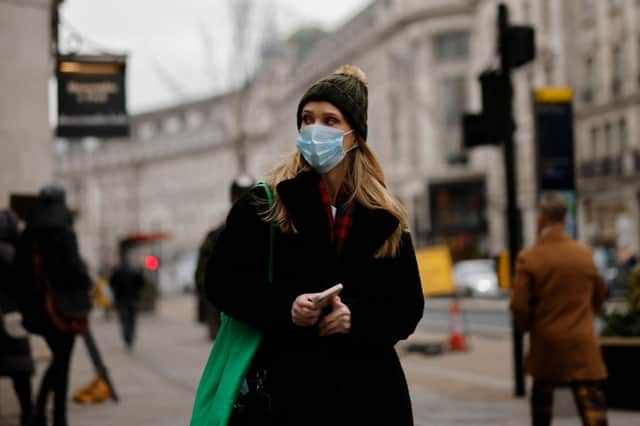Covid-19: expert urges Britons to wear facemasks again after five deaths from Arcturus variant
and live on Freeview channel 276
Britons have been told to wear facemasks again as the new Arcturus Covid variant surges through the UK.
Professor Stephen Griffin, chair of Independent SAGE, a separate panel of experts who gave advice during the pandemic, has said people should return to wearing masks in "poorly ventilated spaces or public transport". It comes after five people who contracted the Arcturus Covid variant have died.
Advertisement
Hide AdAdvertisement
Hide AdThe Omicron sub-variant has been spreading wildly throughout India, with more than 65,000 cases - and some states have brought back mask mandates. Arcturus cases have now been identified in all regions of England, except the North East, and most cases were in London (30) and the North West (22). The median age of cases was 74 years old, and 54 cases were male and 50 cases were female.
The XBB.1.16 strain is now a designated variant as of 19 April due to its increasing international growth and it now makes up around 2.3% of all new cases in the UK, according to the UKHSA.
And while Prof Griffin, of Leeds University, told the MailOnline that the UK is in a better place than during the pandemic, he still encouraged adults to wear high-quality masks when in "poorly ventilated indoor spaces or public transport".
"This may seem like a throwback to last year, but the reality is the virus continues to do harm and those least able to cope continue to suffer," Prof Griffin told the MailOnline.
Advertisement
Hide AdAdvertisement
Hide Ad"In the absence of population-scale mitigations... the focus remains upon individual risk which is, for many, now much lower. However, the situation remains dynamic with waning immunity and high rates of viral evolution.


"If government won’t act to enable everyone to 'live' with Covid, vulnerable people will continue to require precautions and, ideally, others will act with an appropriate level of altruism."
There is currently “insufficient data” to calculate the severity or vaccine effectiveness of Arcturus compared to other variants that are circulating. Health chiefs said sample numbers are still “very low and results may change as further data becomes available”.
Dr Meera Chand, deputy director UKHSA, told NationalWorld: “It is not unexpected to see new variants of SARS-CoV-2 emerge. UKHSA continues to analyse all available data relating to SARS-CoV-2 variants in the UK and abroad and is monitoring the situation closely.
Advertisement
Hide AdAdvertisement
Hide Ad“XBB.1.16 currently accounted for 2.3% of UK sequences between 3 April and 9 April. It is not currently designated a variant of concern.
“Vaccination remains our best defence against future Covid-19 waves, so it is still as important as ever that people come take up all the doses for which they are eligible as soon as possible.”
The main symptoms of Arcturus reported so far include a high fever, a cough and “itchy” conjunctivitis, with the latter being particularly common among children.
Conjunctivitis - also known as red or pink eye - usually affects both eyes and can make them become red and itchy, watery, produce pus that sticks to lashes, and they may burn or feel gritty.
It comes after the World Health Organisation (WHO) upgraded Arcturus to a “variant of interest” last week, meaning the strain has mutations that are suspected or known to cause significant changes, and is spreading widely in several countries.
The WHO has been monitoring the variant since 22 March and warned it is “one to watch” as it has one additional mutation in the spike protein which, in lab studies, shows “increased infectivity”.
Advertisement
Hide AdAdvertisement
Hide AdResearch indicates Arcturus could be one 1.2 times more infectious than the last major sub-variant, which was Omicron. It has a similar profile to its predecessor XBB.1.5, but its additional mutation makes it more infectious and potentially more pathogenic, Maria Van Kerkhove, WHO’s technical lead for Covid-19, said at a press conference last month.
While this does not indicate it is causing more severe disease among those who are infected, the spike protein mutation makes the new variant more capable of escaping antibodies from previous immunity gained either from vaccination or infection.
Ms van Kerkhove explained: “It’s actually very similar in profile to XBB.1.5. It has one additional mutation in the spike protein which in lab studies shows increase infectivity, as well as potential increased pathogenicity. So, it’s one that we are monitoring (...) because it has potential changes that we need to keep a good eye out on.”
Comment Guidelines
National World encourages reader discussion on our stories. User feedback, insights and back-and-forth exchanges add a rich layer of context to reporting. Please review our Community Guidelines before commenting.